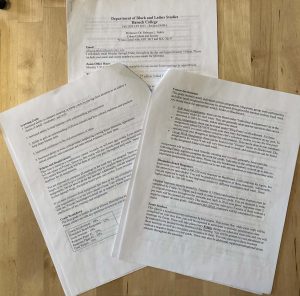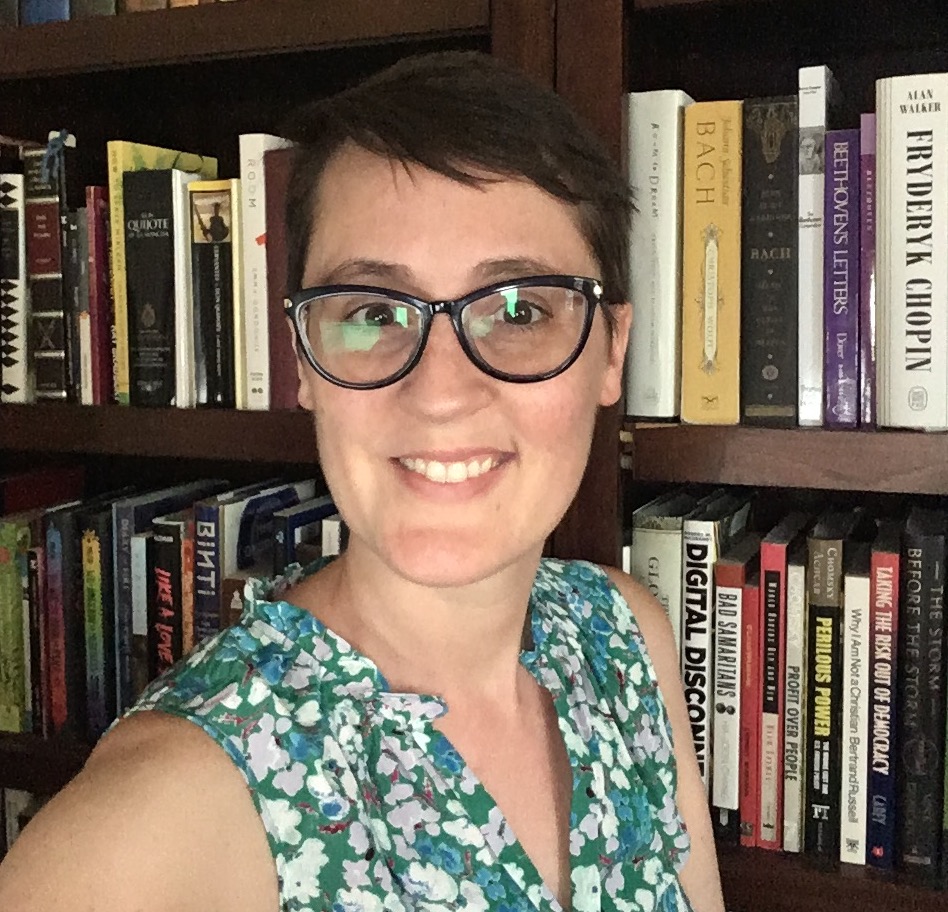I love the first day of class. I really do. It’s exciting to start fresh and meet a new group of students. The fresh syllabus, the introductions, all of it. Of course, it’s a bit different online than in person, but I still enjoy it. Yesterday was my first day for the spring 2021 semester and I met all three of my classes. We introduced ourselves to one another, went over the syllabus, and had a brief overview of what we could expect from our semester. The first day always involves a lot of talking on my part. Where I can create breakout rooms and encourage student discussion during most class sessions, the first day is a lot on my voice! Especially with three classes!
I still get a little bit of first day jitters. Nothing major, but just little things: will the technology work? will students be able to get the textbook? what kind of dynamic will this particular group have? will I remember to log in on time? I’ve been teaching since 2004 and it’s the same every year/semester. It happened when I taught high school, it happened when I taught in person, it happens even now with the classes online. But I love it. It’s an adrenaline rush of sorts. And I can’t think of a time when I didn’t feel relief at the end of the day after meeting my students. I mean, maybe not my throat, after all of that talking, but otherwise!
This semester was no exception. I am really looking forward to working with each of these groups of students. I am a little sad that it is unlikely I will meet any of them in person, but I’m encouraged by what I saw on the first day. Even the cameras! I had more cameras on yesterday than last semester. I tried a little something that I heard from another professor. They mentioned that they turned their own camera off for a few minutes and tried teaching that way. Then asked the students how it was for them to take a class that way. It really gave them a different perspective of what class can be like from the professor’s point of view and I was encouraged that a number of students turned their cameras on after that. So if you need a tip for encouraging cameras when they cannot be required – try that!

 ODAAT debuted in 2017 on Netflix where it lived for the first three seasons. But not without struggle. After the second season, Netflix announced that they were planning on cancelling the show. However, due to a fan-led campaign on social media to save the show (
ODAAT debuted in 2017 on Netflix where it lived for the first three seasons. But not without struggle. After the second season, Netflix announced that they were planning on cancelling the show. However, due to a fan-led campaign on social media to save the show ( So I’m rethinking this approach. Maybe I switch it up. Perhaps two assignments each week? Or perhaps one larger weekly assignment. Or maybe, and hold on for this one, maybe I discuss with the students at the start of the semester what they think the best approach is. Can we come to a consensus? Do we want to do a mid-term project and a final project? Or would we rather have monthly check-ins? Perhaps we just do small/short writing assignments all semester instead of one or two major assignments? This could be in the form of the small assignments I mentioned before or it might be a 1-2 page reflection each week. Maybe it doesn’t even have to be in writing.
So I’m rethinking this approach. Maybe I switch it up. Perhaps two assignments each week? Or perhaps one larger weekly assignment. Or maybe, and hold on for this one, maybe I discuss with the students at the start of the semester what they think the best approach is. Can we come to a consensus? Do we want to do a mid-term project and a final project? Or would we rather have monthly check-ins? Perhaps we just do small/short writing assignments all semester instead of one or two major assignments? This could be in the form of the small assignments I mentioned before or it might be a 1-2 page reflection each week. Maybe it doesn’t even have to be in writing. 


 Fast forward to Fall 2020. I have just had two observations (perk of teaching in two different departments I suppose?). Both of these observations took place via Zoom, the platform I use for the synchronous components of my class. The observers remained off camera and off mic for the duration of the session, truly just observing. And they provided feedback (either in conversation after the class session ended, or via email) that allowed for a dialogue about the sessions. This was helpful. But what, for me, was less helpful, is that the way I run my online synchronous courses is DRASTICALLY different from how I run my face-to-face classes. Many of the group/discussion/reflective elements of my online course take place asynchronously on the Blackboard platform. And my observers were not able to see that. I use the synchronous sessions to recap the asynchronous work that students had throughout the week. It is a time for them to ask questions about what I have asked them to do on their own or with their peers.
Fast forward to Fall 2020. I have just had two observations (perk of teaching in two different departments I suppose?). Both of these observations took place via Zoom, the platform I use for the synchronous components of my class. The observers remained off camera and off mic for the duration of the session, truly just observing. And they provided feedback (either in conversation after the class session ended, or via email) that allowed for a dialogue about the sessions. This was helpful. But what, for me, was less helpful, is that the way I run my online synchronous courses is DRASTICALLY different from how I run my face-to-face classes. Many of the group/discussion/reflective elements of my online course take place asynchronously on the Blackboard platform. And my observers were not able to see that. I use the synchronous sessions to recap the asynchronous work that students had throughout the week. It is a time for them to ask questions about what I have asked them to do on their own or with their peers. 
 There have been many posts by countless educators, parents, and students regarding the transition to online classes that many of us have been forced into this year. And everyone has their opinions on what works and what doesn’t work. Of course, the truth is there is no right answer. There is no easy solution. We just have to do the best we can and adjust as we go (although from an educator standpoint, not having funding cut would REALLY help with this).
There have been many posts by countless educators, parents, and students regarding the transition to online classes that many of us have been forced into this year. And everyone has their opinions on what works and what doesn’t work. Of course, the truth is there is no right answer. There is no easy solution. We just have to do the best we can and adjust as we go (although from an educator standpoint, not having funding cut would REALLY help with this).